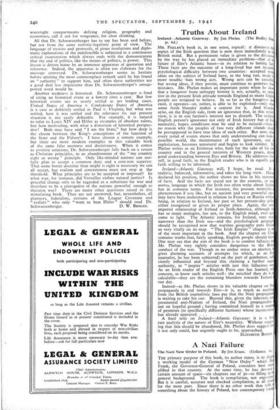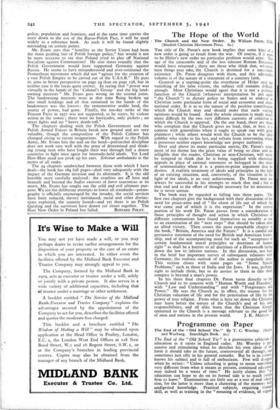A Nazi Failure
The Nazi New Order in Poland. By Jon Evans. (Gollancz. 6s.) THE primary purpose of this book, its author states, is to disp a working model of the German "New Order " which H Frank, the Governor-General of Poland, considers best exe plified in that country. At the same time, he has devoted certain amount of space—six chapters out of 3o—to filling in general background. The book is compilation, not experien But it is careful, accurate and checked compilation, at all eve for the most part. Since there is no other work that tells something about the history of Poland, her contemporary for
policy, population and frontiers, and at the same time carries the story down to the eve of the Russo-Polish Pact, it will be used widely as a reference book. As such it will be found slightly misleading on certain points.
Mr. Evans says that " hostility to the Soviet Union had been the main guiding line of Polish foreign policy," but would it not be more accurate to say that Poland tried to play off National Socialism against Communism? He also states roundly that the Polish Government would have supported Germany against Russia. He seems to have misunderstood and .over-estimated the Promethean movement which did not " agitate for the creation of a vast Polish Empire to be carved out of the U.S.S.R." He puts its aims in better perspective on page 24 than on page 158, but in neither case is the focus quite correct. In saying that "power was virtually in the hands of the Colonel's Group ' and the big land- owning interests " Mr. Evans goes wrong on the second point. The landowning interests were at that time Being broken up into small holdings and all that remained in the hands of the landowners was the forests: the remunerative arable land, the source of power, had gone. Finally, the ten-day strike of the Peasant Party in 1937 was not supported, as he states, by violent action in the towns ; there were no barricades, only pickets ; no street fights and no " heavy death-roll."
The chapters dealing with the Polish Government and the Polish Armed Forces in Britain break new ground and are very valuable, though the composition of the Polish Cabinet has changed owing to recent resignations. With regard to the Polish Army, Mr. Evans hits the nail on the head—patriarchal discipline does not work very well with the army of determined and think- ing young men who have fought their way through half a dozen countries to fight once again for intensely-held ideals. Yet Lord Haw-Haw need not prick up his ears. Solvitur ambulando is the motto of all ranks.
The 24 chapters sandwiched between those with which I have dealt—the book has 184 full pages—deal very adequately with the impact of the German invasion and its aftermath. It is the old horrible story carefully analysed : the cruelties are all here and beneath and beyond the Sadist excesses of furor teutonicus at its worst, Mr. Evans has sought out the cold and evil ultimate pur- pose. We see the deliberate attempts to lower all standards—porno- graphy is officially encouraged by the invader, the social services have been reduced, slavery introduced, racial and other distinc- tions exploited, the country looted—and yet there is no Polish Quisling and the survivors have drawn yet closer together. The Nazi New Order in Poland has failed. BERNARD FOLEY.



























 Previous page
Previous page